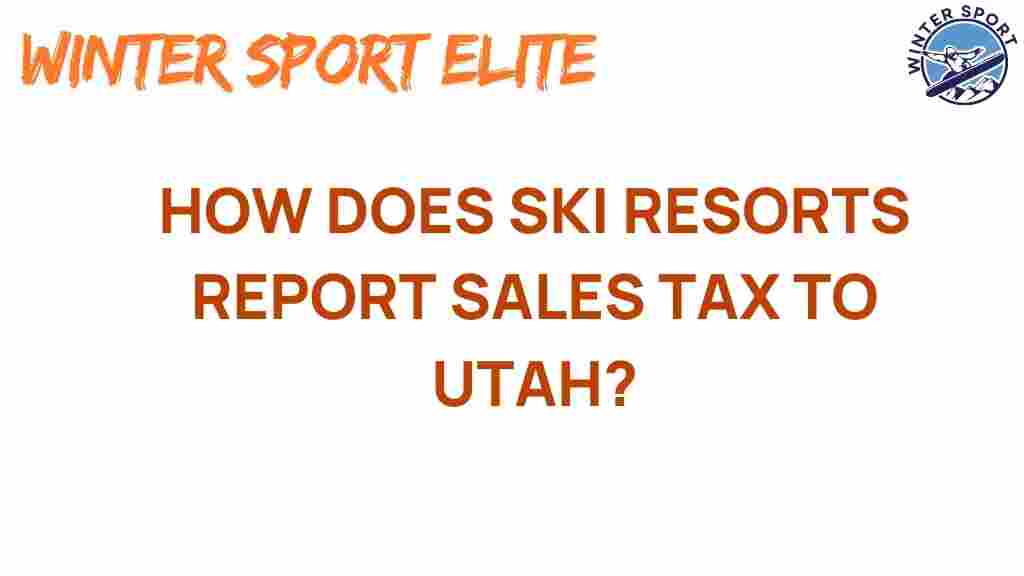Ski Resorts and Sales Tax: Understanding the Taxation Process in Utah
Utah is renowned for its breathtaking ski resorts and the incredible winter sports experiences they offer. As a vital part of the tourism economy, these resorts contribute significantly to the state’s revenue generation through various means, including sales tax. Understanding how ski resorts report sales tax in Utah is crucial for compliance and effective financial reporting. This article unravels the mystery behind the taxation process for ski resorts, offering insights into their role in the overall economy.
The Importance of Sales Tax for Ski Resorts in Utah
Sales tax is a consumption tax imposed on the sale of goods and services. In Utah, it plays a crucial role in funding state and local government services. For ski resorts, understanding and complying with sales tax regulations is essential for several reasons:
- Revenue Generation: Sales tax collected by ski resorts contributes to the funding of public services, infrastructure, and community programs.
- Compliance: Adhering to sales tax regulations ensures that ski resorts avoid legal penalties and maintain good standing with state authorities.
- Financial Reporting: Accurate reporting of sales tax is necessary for effective financial management and transparency.
Understanding the Taxation Process
The taxation process for ski resorts in Utah involves several key steps. Here’s a detailed breakdown:
Step 1: Sales Tax Registration
Before a ski resort can collect sales tax, it must register with the Utah State Tax Commission. This involves:
- Filling out the Sales Tax Registration Form.
- Providing necessary business information, including the resort’s name, address, and type of services offered.
- Obtaining a sales tax license, which must be displayed prominently at the resort.
Step 2: Determining Taxable Sales
Not all sales at ski resorts are subject to sales tax. It’s essential to identify which transactions are taxable:
- Lift Tickets: Generally taxable.
- Equipment Rentals: Taxable, including skis, snowboards, and other gear.
- Food and Beverage Sales: Most food sales are taxable, but some sales may be exempt based on specific regulations.
- Merchandise Sales: Retail sales of clothing and gear are typically taxable.
Step 3: Collecting Sales Tax
Once registered and aware of taxable sales, ski resorts must collect sales tax from customers at the point of sale. The current sales tax rate in Utah is 6.1%, but local jurisdictions may impose additional taxes, leading to a total rate as high as 8.35% in some areas.
Step 4: Reporting and Remitting Sales Tax
After collecting sales tax, ski resorts must report and remit the collected amounts to the Utah State Tax Commission. This process typically involves:
- Filing regular sales tax returns, which can be monthly, quarterly, or annually, depending on the volume of sales.
- Calculating the total sales and the corresponding sales tax collected during the reporting period.
- Submitting the returns online through the Utah Taxpayer Access Point.
- Paying the remitted sales tax by the due date to avoid penalties.
Common Challenges in Sales Tax Reporting for Ski Resorts
While the process may seem straightforward, ski resorts often encounter challenges in sales tax reporting. Here are some common issues and tips to troubleshoot them:
Challenge 1: Understanding Tax Exemptions
Some sales may be exempt from taxation, such as sales to certain non-profit organizations or sales of specific items. Resorts must be vigilant in identifying these exemptions to avoid over-collecting tax.
Solution:
Maintain clear documentation of any exempt sales and verify the status of customers who claim exemption. It’s advisable to consult with a tax professional if uncertain.
Challenge 2: Keeping Up with Tax Rate Changes
Tax rates can change, and local jurisdictions may impose different rates. Failing to apply the correct rate can lead to compliance issues.
Solution:
Regularly check for updates on sales tax rates from the Utah State Tax Commission and ensure that all point-of-sale systems are programmed to reflect these changes.
Challenge 3: Accurate Financial Reporting
Accurate financial reporting is critical for ski resorts to manage their finances effectively. Inaccuracies can lead to audits and penalties.
Solution:
Implement robust accounting systems that track sales and sales tax collected. Regularly reconcile sales records with tax returns to ensure accuracy.
The Impact of Sales Tax on Utah’s Tourism Economy
Ski resorts are a cornerstone of Utah’s tourism economy, attracting millions of visitors each year. The sales tax collected from these visitors supports local and state services, contributing to overall economic health. Here are some ways in which sales tax from ski resorts benefits the economy:
- Infrastructure Development: Sales tax revenue helps fund essential infrastructure improvements, making Utah more accessible to tourists.
- Job Creation: The revenue generated from tourism supports thousands of jobs within the ski resort industry and beyond.
- Community Services: Funds collected through sales tax are reinvested into community services, enhancing the quality of life for residents.
Conclusion
Understanding how ski resorts in Utah report sales tax is essential for ensuring compliance and effective financial management. By following the taxation process—from registration to reporting—ski resorts can contribute significantly to the state’s revenue generation and tourism economy. As winter sports enthusiasts continue to flock to Utah’s slopes, the importance of diligent sales tax practices will only grow.
For ski resorts, maintaining compliance not only helps avoid penalties but also supports the broader economic landscape, ensuring that Utah remains a premier destination for winter sports lovers. With proper understanding and management of the sales tax process, ski resorts can continue to thrive while supporting their communities and the state’s economy.
For more information on managing sales tax for your business, consider visiting the Utah State Tax Commission for resources and guidance.
This article is in the category Skiing and created by WinterSportElite Team
